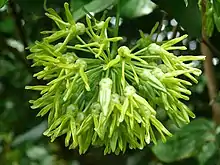| Telosma procumbens | |
|---|---|
 | |
| Kapas-kapas flowers | |
| Scientific classification | |
| Kingdom: | Plantae |
| Clade: | Tracheophytes |
| Clade: | Angiosperms |
| Clade: | Eudicots |
| Clade: | Asterids |
| Order: | Gentianales |
| Family: | Apocynaceae |
| Genus: | Telosma |
| Species: | T. procumbens |
| Binomial name | |
| Telosma procumbens | |
| Synonyms[1] | |
| |
Telosma procumbens, also known as latok, kapas-kapas, dukep, or sabidukong, among many other names, is a species of flowering plant native to the islands of the Philippines and parts of southeastern China and Vietnam. It is a woody vine with elongated heart-shaped leaves. It bears clusters of yellowish green odorless flowers with five twisted-looking fleshy petals arranged in a star shape. These develop into spearhead-shaped fruits with four thin lengthwise ridges ("wings"). The fruit contains multiple seeds stacked in a column. Each seed has a long white feathery tail that allows it to be dispersed by the wind.[1]
The flowers and immature fruit rinds are eaten in Filipino cuisine, with a taste and texture similar to winged beans or string beans.[2][3]
See also
References
- 1 2 Plants of the World Online (POWO), retrieved 16 May 2021
- ↑ Taculao, Patricia Blanca (24 February 2021). "Seven crops indigenous to the Philippines". Manila Bulletin. Retrieved 16 May 2021.
- ↑ Maghirang, Rodel G. (14 January 2017). "Kapas-kapas: An Indigenous Vegetable". Agriculture Monthly. Retrieved 16 May 2021.